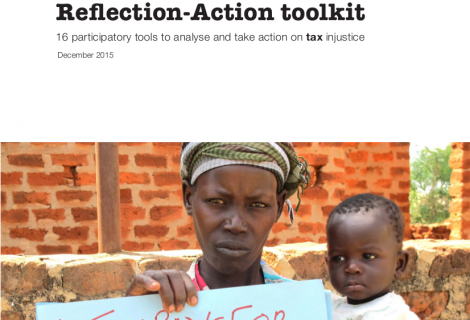
16 participatory tools for communities to analyse and take action on tax injustice
#taxpaysfor our rights
When funds are missing for quality public services, it’s communities living in poverty, particularly women and girls, that suffer the most, making the world more unequal. Around the world, millions of girls are missing out school. Women are more at risk of violence in their cities from poor public transport and lighting. And women are filling the gap where public services don't exist, paying with their time and bodies by looking after the young, elderly and sick.
Tax helps pay for public services. But the world is waking up to how global companies are not paying their fair share of taxes, and how a fairer global tax system could provide a dramatic breakthrough to funding for a world free of poverty and inequality. Developing countries lose an estimated US$213 billion a year to tax avoidance by multinational companies. ActionAid estimates that developing companies give away a further USD $138bn in tax breaks to companies, despite evidence that they're not necessary to attract investors.
World leaders have promised global anti-poverty targets that will be reached by 2030, but these will be missed without adequate financing. Governments must change the tax rules, and make sure any increase in tax is spent on providing essential quality public services that help fulfil the rights of women and girls.
Who is the toolkit for? Power in people
But people most affected by this issue are often not aware of their rights, or how to claim and defend them. ActionAid puts people and power at the heart of the struggle for human rights.
These tools are made to help empower communities to reflect, and act, for their rights. Most of the tools target governments as being able to change the problem, while a few target companies. Some tools are tailored for special groups, such as women or youth.
Please feel free to share, copy, distribute, adapt, and build upon the tools.
What's inside the toolkit?
The tools explore the following key ideas:
- Taxes pay for public services
- Most of us are tax payers
- The richer should pay more tax, the poorer less
- Foreign companies don’t pay their fair amount of tax
Section 1 looks at local tax problems, while section 2 looks at the effects of international and national tax on local public services. Section 3 expands on national and international tax issues. Section 4 assesses your own work.
You may try out all the 15 tools with your group. A tool (or two) may be completed in about 3 hours. You may want to do tools in order as they go from easier to more complicated. Section 3 covers the most difficult tools that require some preparation and abstraction (new ideas not coming from lived experience).